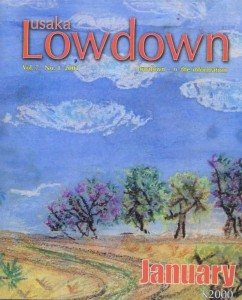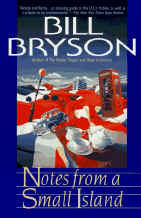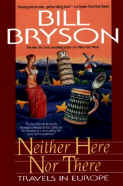 Bill Bryson, Extraordinary Author
Bill Bryson, Extraordinary Author
Born and brought up in America, Bryson moved to England in his late twenties and lived in North Yorkshire with his English wife and four children, before returning to America after nearly two decades. His reason for this decision was to give his wife a chance to shop until 10 pm, seven nights a week and, more importantly, because he had read that 3.7 million Americans believe they had been abducted by aliens at one time or another, and it was thus clear to him that his people needed him.
 Notes From A Small Island was written after he had taken one last trip around Britain before his return to America. His aim was to take stock of the nation’s public and private face and to analyse what precisely it was he loved so much about a country that had produced Marmite, place names like Titsey and Shellow Bowells and people who said ‘Mustn’t grumble’ and why British Rail put the destination of the train on the front of the train. The book tells of his encounters with eccentric landladies and his amusing encounters with Britons on public transport, in railway and bus stations and in pubs. Having read Notes From A Small Island, a laugh-out-load type of book, I was hooked.
Notes From A Small Island was written after he had taken one last trip around Britain before his return to America. His aim was to take stock of the nation’s public and private face and to analyse what precisely it was he loved so much about a country that had produced Marmite, place names like Titsey and Shellow Bowells and people who said ‘Mustn’t grumble’ and why British Rail put the destination of the train on the front of the train. The book tells of his encounters with eccentric landladies and his amusing encounters with Britons on public transport, in railway and bus stations and in pubs. Having read Notes From A Small Island, a laugh-out-load type of book, I was hooked.
Neither Here Nor There chronicles his travels through Europe, either on earlier trips, one with a high-school acquaintance, Stephen Katz, which he freely admits was a serious mistake or on a later one, where his next destination was decided impulsively. As he takes in the different sights of the continent, he examines the culture and illustrates each different nation with his loudly amusing mordant observations of their foibles. The French, for instance, how they stand in an orderly queue for the bus to arrive, but when it does, ‘the line instantly disintegrates into something like a fire drill at a lunatic asylum’. And the drivers who would, in normal circumstances ‘be given injections of thorazine from syringes the size of bicycle pumps and confined to their beds’. In Germany, he is flummoxed by the ominous names of the food – Schweinensnout mit Spittle und Grit, Ramsintestines und Oder Grosser Stuff – and suggests that the Germans should have been required, in the armistice treaty, to lay down their accordions along with their arms. On the parking in Rome, he was convinced that he had just missed a parking competition for blind people. In Hammerfest, he was exposed to a ferocious wind on the headland and discovered that by holding out his arms, he could sail along on the flats of his feet, propelled entirely by the wind, a pastime which he dubbed Irish windsurfing.
The Lost Continent, about his travels in small town America, was his first travel book. Setting off from his hometown of Des Moines, (‘I come from Des Moines. Somebody had to’), he drove almost fourteen thousand miles in search of a mythical small town called Amalgam, the kind of village where the films of his youth were set. Instead he got a series of burgs which he renamed Smellville, Coleslaw, Dead Squaw, Coma or Doldrum. He bemoans the changes to the towns, where in the past, on reaching the outskirts of a town, you would find a gas station and an ice-cream bar and maybe a motel. Now, every town has a ‘mile or more’ of fast food places, motor inns, discount cities and shopping malls. In one of the many franchise pizza places, he told a waitress who was rushing him for his order that he had just been released from prison for murdering a waitress who had been doing just that. This had the required effect of allowing him to decide at leisure. Not only is this book amusing, but it is also censures the American way of life.
 In A Walk In The Woods, he teams up (at least for part of the way) with his old acquaintance Stephen Katz, of Neither Here Not There fame, to hike along the 2,118 mile Appalachian Trail. Along the route, they met up with other hikers and from time to time, the Trail would come within a short distance of a town, when they would take time out to do some laundry and stock up on supplies for the next leg of their journey. Not as amusing as his other books, A Walk In The Woods is compelling reading and brings to the fore the pressure that certain sections of the Trail are under from the spread of civilisation.
In A Walk In The Woods, he teams up (at least for part of the way) with his old acquaintance Stephen Katz, of Neither Here Not There fame, to hike along the 2,118 mile Appalachian Trail. Along the route, they met up with other hikers and from time to time, the Trail would come within a short distance of a town, when they would take time out to do some laundry and stock up on supplies for the next leg of their journey. Not as amusing as his other books, A Walk In The Woods is compelling reading and brings to the fore the pressure that certain sections of the Trail are under from the spread of civilisation.
I haven’t quite finished reading Made in America yet, in which Bryson moves away from small town America and explains how Hollywood became Hollywood; how Henry James complained about the ‘helpless slobber of disconnected vowel noises’ that characterised American speech; and many foreign words found their way into American English. These include words such as poppycock and dunderhead from the Dutch, smithereens and hooligan from the Irish and kindergarten and shyster from the German. According to Made in America, the reason why they travel on the right hand side of the road, it because of wagons, manufactured in a town called Canestoga, where the brakes and running boards were placed on the left, thus compelling drivers to sit on the left. I have still to cover the chapters that deal with eating, shopping, advertising, the movies, sports, politics and the space age, but if the first ten chapters are anything to go by, the rest of the book will be equally amusing and a compelling read.
The other book which I am still reading (yes, I have this habit of reading three or four books at a time – one in the sitting room, one in the bedroom and one in the toilet) is The Mother Tongue. This is a tribute to the English language which was ‘treated for centuries as the inadequate and second-rate tongue of peasants’, but which has now become the undisputed global language. It explains how words from more than fifty languages were absorbed, in one form or another, into the English language and how English words were absorbed into other languages – either in error (button-hole which was once buttonhold); or by adoption (boondocks from the Philippines or ketchup from China). There are also borrowed words, such as al fresco, except to the Italians this signifies being in prison and words in the English language which, perhaps, deserve to be better known, such as arachibutyrophobia which is a morbid fear of peanut butter sticking to the roof of your mouth or a myoclonic jerk, which is the sudden sensation of falling just when you are dropping off to sleep. Pronunciation is covered, and includes anecdotes like the Chinese fellow who when things went wrong would mutter ‘bruddy hairo’ which Bryson took to be a Cantonese invective and only months later realised that he was saying ‘bloody hell’. Spelling and the attempts to simplify and regularise it, which were largely unsuccessful, despite George Bernard Shaw leaving the bulk of his estate to promote spelling reform. The dangers of interpretation into or from other languages are also explained, such as an airline advertisement translated into Spanish which told prospective passengers that they could fly without clothes on (en cueros) rather than enjoy sitting in leather (en cuero) seats. And then there is America’s Jimmy Carter who during a trip to Poland told them that he had ‘abandoned’ America that day rather than leaving it. The origin of languages are examined, including pidgins which are rudimentary languages formed when people from diverse backgrounds are thrown together by circumstances, essentially makeshift tongues which seldom last long. Pidgins are different to creole, which devolve from pidgins although they appear to be primitive and even comical (‘wesmata’ for ‘what’s the matter?’). Two African creole languages are Swahili and Afrikaans (see page 45 for an explanation of some of today’s Afrikaans expressions). The origins of names are explained and also different types of word games such as crosswords, palindromes (Sex at noon taxes) and anagrams (see page 54 in this issue). Mother Tongue is another book, full of anecdotes and with not a single dull paragraph.
Sitting in my bookshelf and waiting to be read is Notes From A Big Country, which is a collection of short essays in which he takes a swipe at American culture and finds amusement in the mundane. Bryson’s latest book to be published is Down Under and whilst I was writing this article, I received a phone call from the Book Cellar to say that the copy that I had ordered had now arrived, so tomorrow I shall drop by to collect it, knowing that I will be able to enjoy this coming weekend by relaxing with a good, amusing, easy-to-read book.
Leave a Reply
You must be logged in to post a comment.